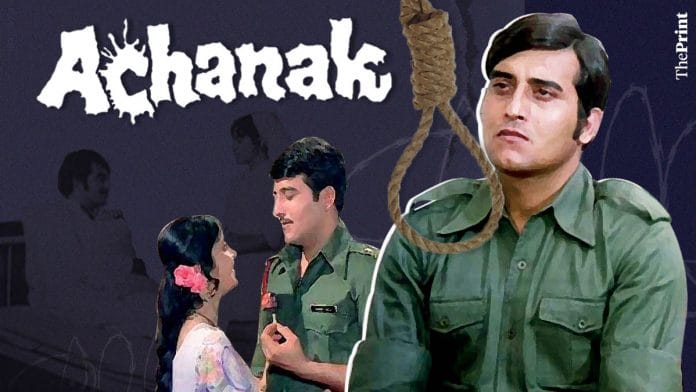Writing about a movie based on a well-documented real-life murder means there are no real spoilers. Yet Gulzar’s Achanak (1973), inspired by the sensational Nanavati case that rocked India in 1959, still manages to surprise.
Many will recall the story of Kawas Manekshaw Nanavati, the Naval officer who killed his wife, Sylvia’s lover (his friend Prem Ahuja), then turned himself in. The case took India by storm, and every aspect, from the morality to the jury trial and retrial, was discussed and dissected endlessly in drawing rooms, newspapers and magazines.
The case was India’s first brush with such a publicised, high-profile crime of passion involving upper-class people. It was also the country’s first experience of a trial by media, and it was the case that ended up marking the end of our jury trial system. And it has, of course, spawned a number of films. From Yeh Rastey Hain Pyar Ke (1963) to Rustom (2016), Bollywood has long been fascinated by this story.
But perhaps one of the most intriguing and nuanced portrayals of this gripping crime thriller is Achanak, which is quiet, subtle and, technically speaking, only takes off from the Nanavati case but actually asks much larger questions — about the dharm of lawyers and doctors and the use of capital punishment.
It is also a film that shows the versatility of Vinod Khanna, who was known for his performances as the hardboiled villain or as the upright cop with high-octane fight sequences. This movie, instead, showed him painted in shades of grey and he gained much critical acclaim for his portrayal of the character based on Nanavati.
In the week of Vinod Khanna’s birth anniversary, here’s a flashback to Achanak.
Also read: Raat Aur Din, directed by Satyen Bose, was the perfect swansong for Nargis
Less thriller, more meditation on medicine and law
The film opens in a hospital. Ranjeet Khanna, an officer in the Indian Army, has multiple gunshots in the chest and the surgeon (Om Shivpuri) is under pressure to do what he can to save him, even though the doctor insists this is an impossible task.
One might think this pressure is coming from loving relatives or friends, but it isn’t. Because Ranjeet Khanna has been convicted for murdering his wife, Pushpa (Lily Chakraborty), and friend Prakash (Ravi Raj) for having an affair, and he has been given the death sentence. He had asked permission to make a brief visit back home, which he was granted, but once there, he made a run for it, and in the ensuing chase, the police shot him. If he survives, he will go to the gallows.
The film does go somewhat into thriller territory with the use of well-edited flashbacks that take us through how Ranjeet found out about Pushpa’s adultery and how he killed both her and Prakash (although even the actual murder scenes are given an understated treatment), but far more interesting is its meditations on the medical profession, the duty of a doctor to save anyone who has even a sliver of life breath in them, even if it means that person is simply going to die another death, at the hands of the judiciary.
“Main apne dharm se majboor hoon, aur kanoon apne dharm se,” says the distraught surgeon to his junior colleagues after they have said an emotional goodbye to a recovered Ranjeet, knowing what is to come, guilt-ridden that by saving his life, they have condemned him to death.
The junior colleagues, a doctor, Kailash (Asrani), and a nurse, Radha (Farida Jalal), have grown exceptionally fond of Ranjeet during his weeks of recovery, and his relationship with Radha, whom he has taken to calling his sister, is particularly well etched. The equation between a nurse and a patient is not always given its due, as nursing is never shown to be as glamorous or sought-after an occupation as being a doctor, but here, it is given its due.
While the medics’ lack of judgment of Ranjeet is welcome, the film does leave one with questions about whether this is purely out of their focus on their duty, or whether they believe he was right to do what he did, as the husband of a cheating wife. Even Pushpa’s father-in-law (Iftekhar), who happens to be Ranjeet’s boss in the Army, seeks his pardon in court, but it is never spelt out whether this is because of Ranjeet’s prowess as an officer, a sense of family loyalty or because somewhere, even her own father feels Ranjeet was justified. Or it could be none of these and merely a stand against capital punishment.
The film doesn’t answer the questions it raises, but the fact that it raises them, and the sensitivity with which it does so, is what makes Achanak such a remarkable work of art.
Also read: Salaam Bombay! is a haunting exploration of child labour in India






